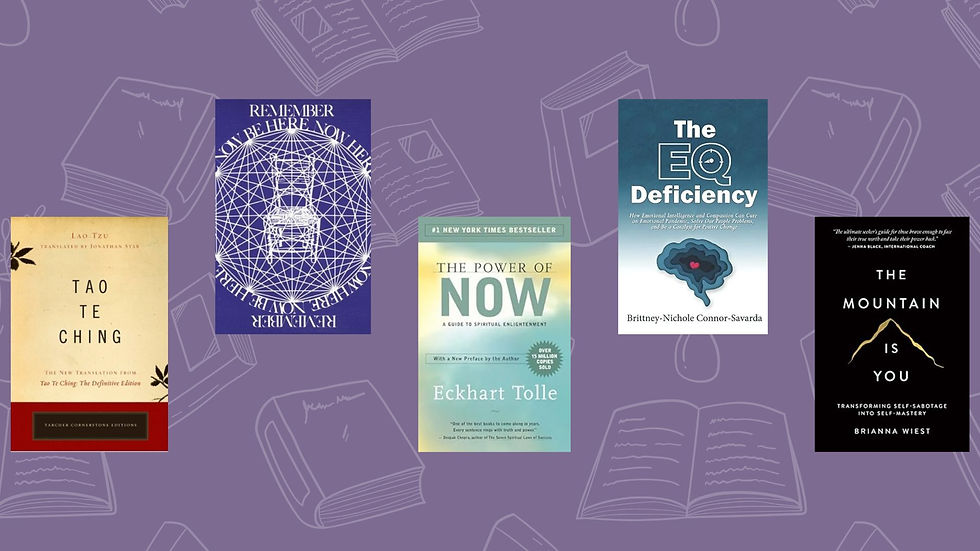How to Develop Your Emotional Intelligence
- Brittney-Nichole Connor-Savarda
- Apr 1, 2023
- 3 min read

Emotional intelligence is an essential skill for anyone looking to succeed in life. It's not something you can use only when you need it; it must be embraced and embodied as a way of life. It encompasses your ability to understand, manage, and express your emotions, as well as the emotions of others. Here are some tips on how to develop your emotional intelligence.
Pay Attention to Your Feelings and Emotions
Learning to nurture our emotional intelligence begins with cultivating greater self-awareness. If we take the time to check in with ourselves throughout the day and explore our emotions – both positive and "negative" – we're taking a crucial first step towards being better attuned to our inner world. It's just as important to recognize how our thoughts, beliefs, and actions affect the people around us. We can become more sensitive to the clues that tell us what those people might be feeling, develop empathy, and learn how to respond appropriately in any situation.
Learn How to Manage Your Emotions
Self-regulation is necessary to maintain optimal mental and physical well-being. It involves understanding and managing our emotions, thoughts, and behaviors so that we can think about and correct any impulsive or irrational reactions or make decisions.
There are many approaches to self-regulation. Depending on your needs and preferences, some may work better than others. Here are three techniques that tend to work well for most people:
Intentional breathing is a powerful tool to reduce anxiety in the moment and prevent us from acting impulsively. It helps us bring our attention back to the present moment, which can help us become more aware of our emotions and reactions. Deep breaths slow down our heart rate and decrease muscle tension, allowing us to make thoughtful decisions instead of responding impulsively in the heat of the moment. This can be especially helpful during times of stress when it’s easy for emotions to take over.
Focus on being grateful: Gratitude is an incredibly powerful emotion that can help us regulate our emotions and cultivate overall well-being. By expressing appreciation and gratitude for all of the blessings in our lives, we can better cope with difficult situations and create a more positive outlook. Gratitude also helps improve relationships, as it encourages us to be more understanding, compassionate, and supportive of those around us. Making gratitude part of our daily routine is one of the best ways to foster emotional resilience and strengthen our well-being.
Exercise and think through your emotional triggers: Exercising can be incredibly effective in reducing emotional anxiety because it allows you to release built-up emotional energy. Processing your thoughts while you exercise can provide a much-needed release from anxious thoughts that are causing distress and offer a sense of clarity to help you process your emotions.
You can tell when a practice is working if you notice the following:
Your heart rate decreases.
Your anxiety or stress lessens.
You prevent yourself from reacting on impulse.
You talk yourself through the problem.
You feel more calm and collected.
Develop Social Skills
Having strong social skills is an essential component of emotional intelligence. Developing the ability to communicate meaningfully - free from aggression, speaking over each other, or shyness - is crucial for creating relationships and gaining respect and trust. To start, knowing why you're engaging in conversation is important. Are you acting out of genuine curiosity or self-interest? Being honest with yourself is critical and can be challenging.
But, when you begin to communicate authentically, seek out meaningful conversations, ask interesting questions, and actively listen to what the other person has to say - you will start to feel a shift within yourself. You won't have to rely on social scripts because you'll be able to communicate from a place of genuine understanding.
Emotional intelligence is a critical skill we should strive for to succeed in life. By taking the time each day to understand and manage our feelings and those of others around us, we can develop our emotional intelligence capabilities over time and reap its many benefits – including increased confidence and better relationships. Hopefully, these tips have provided insight into how best to develop your emotional intelligence skills.



Comments